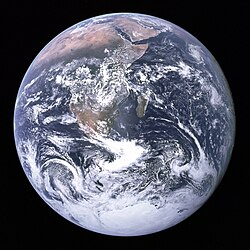Ecospace
 |
|
 
|
|
 
|
|
| Ecology addresses the full scale of life, from tiny bacteria to processes that span the entire planet. Ecologists study many diverse and complex relations among species, such as predation and pollination. The diversity of life is organized into different habitats, from terrestrial (middle) to aquatic ecosystems. |
Ecology (from Greek: οἶκος, "house", or "environment"; -λογία, "study of") is the scientific analysis and study of interactions among organisms and their environment. It is an interdisciplinary field that includes biology, geography, and Earth science. Ecology includes the study of interactions that organisms have with each other, other organisms, and with abiotic components of their environment. Topics of interest to ecologists include the diversity, distribution, amount (biomass), and number (population) of particular organisms, as well as cooperation and competition between organisms, both within and among ecosystems. Ecosystems are composed of dynamically interacting parts including organisms, the communities they make up, and the non-living components of their environment. Ecosystem processes, such as primary production, pedogenesis, nutrient cycling, and various niche construction activities, regulate the flux of energy and matter through an environment. These processes are sustained by organisms with specific life history traits, and the variety of organisms is called biodiversity. Biodiversity, which refers to the varieties of species, genes, and ecosystems, enhances certain ecosystem services.
...
Wikipedia
